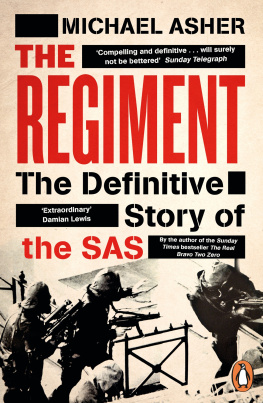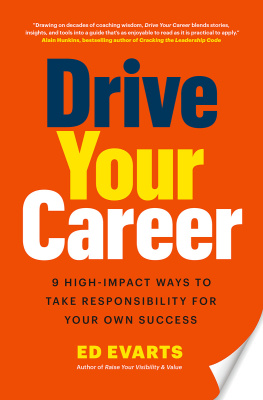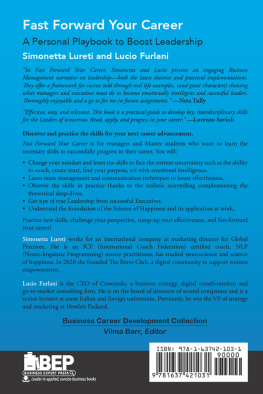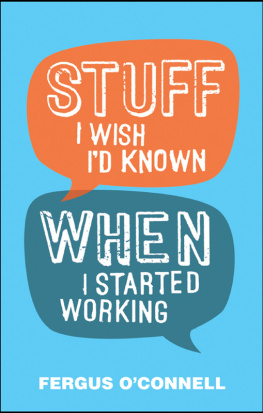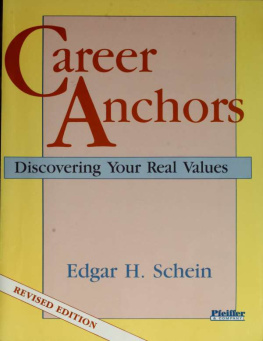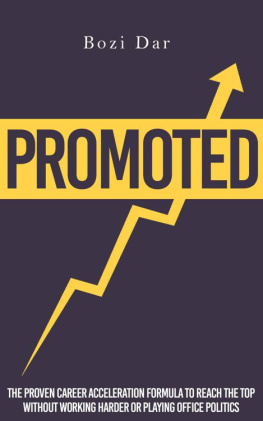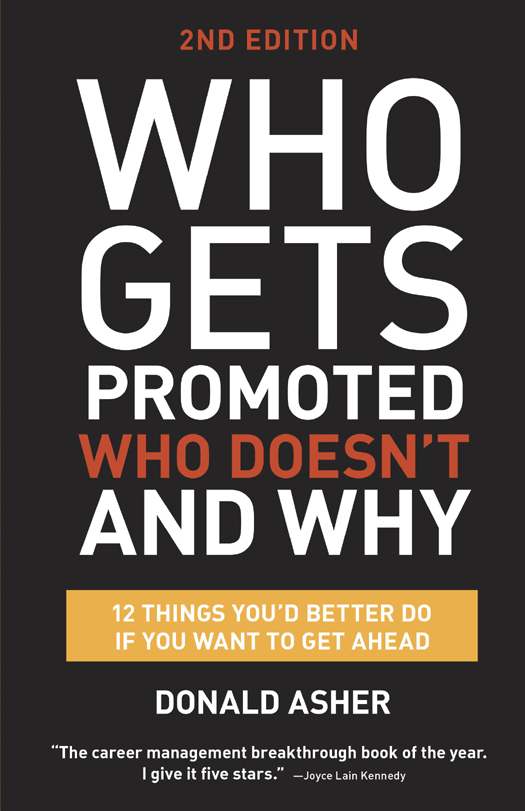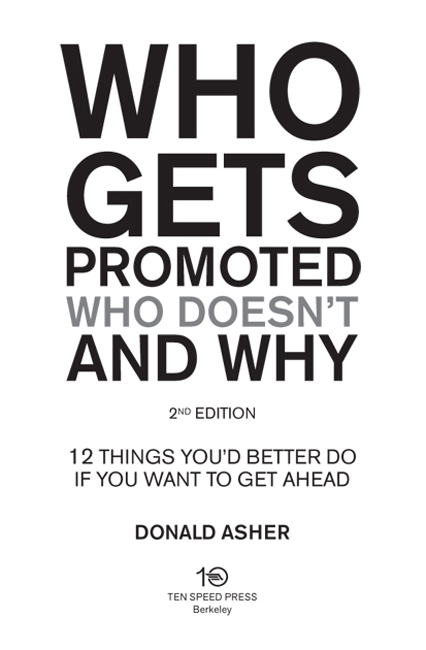The names of most, but not all, of the careerists used in the case studies have been changed. Some details were altered to disguise the specific persons being profiled, either at their own request or at the insistence of Ten Speeds meddlesome legal department. Certain conversations have been reconstructed from memory and are based on more than twenty years of experience coaching fast-track executives.
Copyright 2007, 2014 by Donald Asher.
All rights reserved. Published in the United States by Ten Speed Press, an imprint of the Crown Publishing Group, a division of Random House LLC, a Penguin Random House Company, New York.
www.crownpublishing.com
www.tenspeed.com
Ten Speed Press and the Ten Speed Press colophon are registered trademarks of Random House LLC.
A previous edition was published in the United States by Ten Speed Press, an imprint of the Crown Publishing Group, a division of Random House LLC, New York, in 2007.
Some portions of this book originally appeared in other forms in the Wall Street Journal s Managing Your Career guide and on CareerJournal.com, the free executive career site from the Wall Street Journal . Reprinted by permission from Dow Jones & Co., Inc., and CareerJournal.com.
Asher, Donald.
Who gets promoted, who doesnt, and why : 12 things youd better do if you want to get ahead / Donald Asher. Second edition.
pages cm
Includes bibliographical references and index.
1. Career developmentUnited States. 2. PromotionsUnited States. I. Title.
HF5382.5.U5A75 2014
650.1--dc23 2014007789
Trade Paperback ISBN: 978-1-60774-600-3
eBook ISBN: 978-1-60774-601-0
v3.1
For Lisa
CONTENTS
ACKNOWLEDGMENTS
I owe this book, really, to my clients, those fast-track careerists who so generously shared their experiences with me over the years. We plotted and schemed together. You went for it, and you beat out smarter, better, more attractive rivals to win advancement. You looked in the mirror and were honest about what you had to do to stay competitive. You were brave and courageous when it would have been so easy to choose to be complacent, overpaid, and lazy. You rejected the status quo. You created your own next reality. It has been truly exciting to work with such ambitious, talented, smart, and genuinely charming individuals. Thank you.
This is my tenth book, and no one gets this far without backing. I am truly indebted to Ten Speed Press. They have stuck by me for all ten of these titles, an unusual run in the modern publishing world. Their loyalty may not have always been justified, but it has always been deeply appreciated. Aaron, Kaitlin, Sarah, Fuzz, Phil, Lorena, George, and Jeff, I appreciate all youve done for me on this book and on all the others.
I want to acknowledge Bill Watkins Sr., Tia Woodward, and Ellie Hall, some of the most brilliant businesspeople I know, for giving me fantastic interviews for this book. All of the careerists, executives, and HR officers I interviewed were more than helpful, and this book wouldnt have been any good without their wisdom and generosity.
And I am appreciative of Alan Ferrell, former director of management Placement for Purdue Universitys Krannert Graduate School of Management. Alan, forgive me for misspelling your name in the last book, and check out your quote in this one! I hope I got it right.
Finally, I appreciate you, dear reader. I appreciate your willingness to try to control your own destiny, your desire to find rewards commensurate with your contributions, and your hankering for colleagues of the same fine caliber as you. Go for it! You deserve your success.
PREFACE
Dear Reader,
Thank you for picking up this book. It has the potential to change your life. Everything that happens to you from this point on can be different. You can have a different outcome, a different futuredifferent from other workers, and different from the other you, the one who didnt pick up this book, the one who didnt try to maneuver for promotion.
This little book went around the world in the media, and was named career management book of the year in Joyce Lain Kennedys nationally syndicated column, Careers Now. The award-winning career portal QuintCareers named me a Career Mastermind because of this book. When you register that you have accepted a job offer at Columbia Business Schools MBA program, they hand you this book. Many other graduate and undergraduate programs use the book in the same way. You got a job? Great. Now use this book to create a reputation and get promoted. I deeply appreciate career centers and all that they do for students. Thousands upon thousands of you, readers from around the world, have used this book to achieve your goals, and I look forward to each and every one of your emails and stories. Your success is eternally gratifying to me.
The tips from the book that seemed to resonate the most, according to your reviews and in your letters and emails, were these:
A promotion is never a reward, its a prediction.
Irreplaceable people cannot be promoted, ever.
There is a structural bias in favor of hiring from outside rather than promoting from within, and you must provide certain specific assurances to overcome that bias.
Youll see these, and much, much more, in the following pages.
The first edition was a bit of a risk. My editors werent sure if it made sense to write a book just for top performers and highly ambitious people. I believed that there was plenty of reason to do it. First of all, the majority of workers dont read any career books at all, so an author is automatically writing for the top half of all careerists. But I knew there were smart, ambitious people out there who could put these principles into play, who didnt need the kind of rudimentary advice in other guides, who didnt need to pay money to read advice like this: Polish your shoes. I wrote this book for smart, ambitious, hard-working, accomplished contributors. Its the opposite of remedial. Its about optimizing and maximizing your career experience.
The tips and techniques that made this book a success did not come from me. They came from the highly ambitious people I met in my career coaching business. I spent twenty years studying what fast-track careerists do, and I have distilled their advice, and their strategies and techniques, into this tome. I am merely the vessel. The content comes from the real experts, that is, people who get promoted, again and again, throughout their careers.
By the way, you do not need to decide to become a fast-track careerist to use the techniques in this book to solve a career problem. You may not become one of those people who will move to Outer Siberia if it will lead to career advancement, or who will turn your entire private life over to a concierge so you can grind out insane hours to win a promotion. You can use these techniques at will, ad hoc, when and how you need them, to best a rival, fix a problem with your boss, improve your reputation, and so on. The techniques work when and how you choose to deploy them. I invite you, however, to push your limits. The fast-track careerists are onto something. If you love your job, youre pretty likely to like your life. Most of the fast-track careerists who gave me tips for this book love to work, and they love their work.
The other source of information for this book came from human resources professionals, the people who have to decide whom to promote and whom to pass over, whom to offer a stretch assignment and whom to reassign into a less responsible role. Some of the best warnings about what not to do came from them, the most important of which is: Dont go over your bosss head without her permission, ever (see ).


